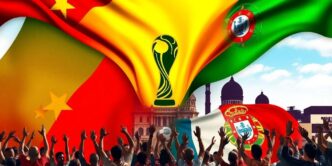Portugal’s center-right Democratic Alliance, led by Luis Montenegro, has narrowly won the general election, securing 80 seats in the 230-seat National Assembly. Despite this victory, the far-right Chega party made significant gains, complicating the political landscape.
Key Takeaways
- The Democratic Alliance won 80 seats, while the Socialist Party secured 78 seats.
- The far-right Chega party surged to 50 seats, up from 12 in the previous election.
- Luis Montenegro has ruled out any coalition with Chega, despite their significant gains.
- The election was triggered by the resignation of Socialist Prime Minister António Costa amid a corruption probe.
Election Results and Political Implications
The Democratic Alliance, a coalition of the Social Democratic Party (PSD) and two smaller conservative parties, narrowly defeated the incumbent Socialist Party. The final tally gave the Democratic Alliance 80 seats, while the Socialist Party secured 78 seats. Chega, a far-right party led by André Ventura, surged to 50 seats, making it a potential kingmaker in the new parliament.
Luis Montenegro, the leader of the Democratic Alliance, has reiterated his stance against forming any coalition with Chega, citing their xenophobic and populist policies. However, the minority government will face challenges in passing legislation without Chega’s support.
Surge of the Far-Right
Chega’s rise marks a significant shift in Portuguese politics. Founded just five years ago, the party has capitalized on public dissatisfaction with traditional parties. Their platform includes stricter immigration controls, tougher measures against corruption, and controversial proposals like chemical castration for certain sex offenders.
Ventura has built alliances with other far-right leaders in Europe, including Matteo Salvini of Italy, Marine Le Pen of France, and Santiago Abascal of Spain. Despite their controversial policies, Chega’s influence in the new parliament cannot be ignored.
Challenges Ahead
The new government, set to take office on April 2, will present its policy proposals to Parliament. If a vote of no confidence is brought and succeeds, another party leader will be invited to form a government, or new elections will be held.
Montenegro’s refusal to collaborate with Chega could lead to political instability. Ventura has already threatened to obstruct key votes, such as the state budget, unless his demands are met. This could force Montenegro to reconsider his stance or face the possibility of another election.
Background and Context
The election was called after Socialist Prime Minister António Costa resigned in November following a corruption probe. Although Costa was not accused of any crime, his resignation led to a leadership change within the Socialist Party, with Pedro Nuno Santos taking over.
The political landscape in Portugal has been dominated by the Social Democrats and Socialists for decades. However, the rise of Chega indicates a growing discontent with the traditional bipartisan system. The new government will need to address pressing issues such as the housing crisis, strained public services, and low wages to regain public trust.
Conclusion
Portugal’s recent election has resulted in a complex political scenario. While the center-right Democratic Alliance has claimed victory, the significant gains made by the far-right Chega party pose challenges for the new government. As Luis Montenegro prepares to take office, the political dynamics in Portugal remain uncertain, with potential implications for the country’s future governance.













